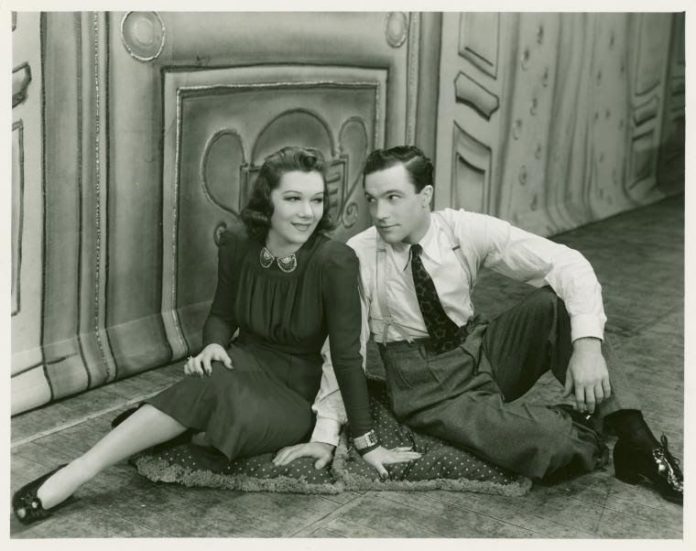
What is a feminine behavior, if it exists? We know what the stereotypes are, but it’s not really the stereotypes that need defining: It’s the more troubling idea of a behavioral tendency leaning, for whatever reason, more toward one sex than the other.
In the 1940s, long before genderfuckery was an acceptable lens through which to view American culture, a queer lyricist posed this very question, hidden in one of his heroine’s songs:
What is a man:
Is he an animal,
Is he a wolf,
Is he a mouse,
Is he the cheap or dear kind?
Is he the champagne or beer kind?
The song, “What Is a Man,” is from the play is Pal Joey, which opened on Christmas Eve, 1940 with a book by John O’Hara, and music by Richard Rodgers and lyrics by the fantastically gay Lorenz Hart.
The story of its opening night is a dramatic one, full of stereotypical “feminine” behaviors that happened to be performed by men. At the show’s curtain, Rodgers observed from his traditional seat in the back of the orchestra that: “approximately one half of the first-night audience applauded wildly while the other half sat there in stony, stunned silence.” The critic Clifton Fadiman would later compare this response to the Rite of Spring riot of 1913. So much for a reception.
On the way to the after-party, O’Hara, displeased with the first performance¹, vomited out the cab window. At Hart’s apartment, the three authors anxiously awaited the reviews. They had cause to be nervous: the Times’ Brooks Atkinson panned it as trash, asking; “can you draw sweet water from a foul well?” The lyricist responded to the cut by locking himself in his bedroom crying and refusing to come out for the rest of the night.
There’s always been something weirdly endearing to me about a work that can reduce its own creators to weeping and vomiting. One never thinks of 40s musicals as having that much at stake. But Joey, a show that gets its laughs from flipping gendered behavior on its head, was different. It was controversial on at least two counts: First, there was the nature of the material it was adapted from, a series of stories O’Hara had done for the New Yorker written in the semi-literate voice of Joey, a “heel” of no redeeming qualities, which comes across as a mix between Damon Runyon and Alexander Portnoy, but somehow more sexist:
“Then I told her what I thought of her and her sister and if she ever showed her face around the hotel I would knock her teeth down her throat. Woman or no woman. I shut her up the bitch. I said she and her fine feathered sister.”
There’s always been something weirdly endearing to me about a work that can reduce its own creators to weeping and vomiting—one never thinks of 40s musicals as having that much at stake.
There was also the fact that the adaptation meant translating Joey’s charming voice into song—no mean feat. And then, there was the overall premise which, as far as musicals go, was unorthodox and uneventful: Joey cons himself into a job as an MC at a cheap nightclub (“not cheap in the whorehouse way,” O’Hara’s stage directions read, “but strictly a neighborhood joint”) then into the bed of a society woman who pays for him to have own club, finally fucking it up and ending back where he started, trying to hit on a girl and spectacularly failing. Nothing in the way of redemption happens in the end, and nobody gets laid. Even more criminal for a musical, there’s no promise of sex in the near future. It stays strictly in media res, and it only lasts until people get sick of each other, which is quicker than one might imagine. Sex stays neatly separate from romance throughout, and the elusiveness of an intersection between them provides much of the poetry of the plot, prompting, among others, the line: “You been working in these joints so long you think anybody with clothes on is pretty.”
A musical that was almost bored with sex: It’s one of those inventions no one would have thought needed inventing. Yet this was O’Hara’s métier from early on: the creation of groups of characters so resolutely over sex that they could openly talk about on the page. At least, as openly as they were allowed. “We knew so much,” Jim Malloy says of his group of friends in Imagine Kissing Pete, “and since what we knew seemed to be all there was to know, we were shockproof.”
A musical that was almost bored with sex: It’s one of those inventions no one would have thought needed inventing.
When O’Hara reached out to Rodgers and Hart with the idea, it’s hard to tell how close a collaboration he had in mind, but one can assume he knew his mark. Hart, a person of “few observable illusions” had quite a bit in common with O’Hara, a person of many. Locale was important to both: For O’Hara it was the coal mining country of Pottsville, Pennsylvania; for Hart it was consistently Manhattan. Both O’Hara and Hart redefined the notion of functioning alcoholism to form an enabling yet oddly productive team, as O’Hara hints at in the piece he wrote right after Hart’s death in 1943:
“Well, I wish he were here to help me [write this]…he probably would say “Let’s skip it, Baby. I’ll buy you a stimulant,” and we would be gone for several days. But somehow or other we would be back in time for the printer’s deadline and the piece would get done. Something like that occurred on a project we did together a few years back.”
Most importantly, they spoke the same language, and spoke it through a distinct style of writing that is so seamless as to seem at times like a lack of style, as well as an investment in authentic, everyday speech, however spurious their own claims on it could seem. In Pal Joey’s libretto, the shift between dialogue and lyrics is seamless. The stage show was a perfect marriage between two people who were both, though in crucially different ways, fiction writers whose characters seemed to know everything.
But the problem with knowing everything—at least, in 1940, and meaning ‘everything’ in the sense that Hart and O’Hara’s men and women do—is that it invites quite a bit of censorship. This problem can’t have been foreign to any of the writers of this period, but there is a sense, in the theater at least, of a delicate balance between what audiences could be directly told, and what they could pick up on their own—a balance that the best playwrights and lyricists made it their job to strike. Pal Joey was banned in Boston, the fate that famously used to befall plays too sexual or crude for a non-New York audience. The many interpretations of Joey have also been able to shave off some of its edge. Gay² actor Gene Kelly originated the role, turning Joey a sleazy guy with a clear queer subtext. In the film version, the role of Joey would be whitewashed in order for Frank Sinatra to play it. In the 1957 movie, Joey is a down-on-his luck ladies’ man, not a “gigolo” in the parlance of the original. A recent production even adds in an openly-gay character.
Even weirder is the fact that so many songs from Joey considered shocking in the context of the play have lived on as romantic standards, robbed of their bite and turned into inoffensive, crooning love songs. The acerbic “My Funny Valentine,” where Joey basically negs the girl he wants to sleep with in verse. “Bewitched, Bothered and Bewildered,” where Joey’s older client Vera admits that she’s dickmatized by the guy even though she doesn’t like him very much.
The original sleazy context of the show was divisive: it’s what made it possible for the opening night audience of Pal Joey to be so evenly split as it was. In a pre-1940s musical, one could expect mild titillation and a stream of playful references to sex, but seldom as anything more than a joke, and seldom as mean-spirited a joke as Pal Joey clearly meant it. Hart’s lyrics defined themselves by their opposition to the brand of separate bedroom thinking that permeated the Broadway of the time. Their style had something of a reputation for their trademark slyness, their fascination with the deviant, the erotic, and the intersection between romantic and sleazy.
As, of course, did Lorenz Hart, to which endless anecdotes will attest: He was called out in a magazine profile for boasting an impressive literotica library; He once wrote a set of lyrics on a roll of toilet paper and gave it to the star of one of his shows; He attempted to adapt a book called Son of the Grand Eunuch (exactly what it sounds like) into a musical called Chee-Chee, praising the original book on record saying: “It’s got balls!” He wrote lyrics for instantly-dated shows like “Too Many Girls” and “Lido Lady”, with songs like “A Lady Must Live”, whose heroine boasts: “With my John and my Max/ I can reach for a climax” and stocked them with Wildean epigrams like: “It is wrong not to do something wrong.”
A world in which a cock can be termed “nature’s mistake” is a thrilling one.
And then there was his perspective—or rather, the perspective from which he chose to write. Hart had much to say about “men” in general, and he said most of it as a woman. At least, in the character of one. Weirdly enough this is the aspect of Hart’s work that, for its time, was least radical of all. Gender-swapping was something of an imperative for queer lyricists in a pre-Morrissey age, and Hart is nothing if not a proto-Morrissey figure, spilling his guts in a style as oblique as it is violently personal. For these and other reasons, his work had been discussed in feminine terms from the start. In an early profile of the team, Rodgers is the “tall, suave member” while Hart is the “nagging wife” of the relationship, while on the level of form his rhymes were famous early on for being feminine as well as internal.
[embedded content]
This may be how it happened that, despite being something of a burlesque, Joey would be written mostly from the point of view of and in sympathy with its female characters, namely Vera Simpson (a stunning Rita Hayworth in the movie,) the rich, married ‘dame’ who patronizes Joey and makes most of the play’s action possible. There are no passive, future tense love songs of the classic, yearning Hart variety for Vera. There is the parody “The Flower Garden of My Heart,” the sex-ode “In Our Little Den of Iniquity,” the conflicted, self-disparaging “Bewitched, Bothered, and Bewildered.” In terms of what’s on the page in Joey, it’s mostly pure bitchiness: O’Hara lays out a story in which no one can really be sympathized or identified with, and Hart bolstering everything up with lyrics freed from the constraints of optimism and truer to the form of an earlier Hart heroine who moaned that “That Pollyanna stuff, too, is tough to endure”.
You get a sense that by 1940, he’d been itching to be free of optimism in general, and Joey’s cast of vulgar, slick, and obnoxious characters provided the perfect opportunity to cast off the yoke of it. The aging Vera, in song, describes her lover as someone whose “thoughts are seldom consecutive”, who is “kept enough,” has “slept enough, and yet where it counts, he’s adept enough.”
Like most Hart characters and a great deal more O’Hara ones, Vera is someone who drinks to get drunk, and who finds intellect to be more a hindrance than an asset to love, summed up in a soliloquy from an earlier show, in which a woman confesses:
“I read my Plato/ Love I thought a sin/
But since your kiss/ I’m reading Mrs. Glyn”
For Hart, the leap from Plato to 1930s romance writer Elinor Glyn is an enviable one. For Hart’s women, the analytical is always the enemy, as bourne out by Vera’s other solo “What Is a Man,” where she wonders aloud about what gender actually means. After ultimately declaring a man to be “nature’s mistake since the world began”, admits:
They’re all alike,
They’re all I like
A world in which a cock can be termed “nature’s mistake” is a thrilling one. Within it, Vera will refer to Joey in feminine, ‘kept’ terms, telling him to ‘go put on your new frock’ and treating him more or less like a dildo throughout. When he shows distaste for the nickname she’s given him, “Beauty.” Vera is, in other words, a gay man disguised as an older woman. Did Hart know this when he wrote her songs? Did he know he was writing a gay relationship?
That’s the point: we know, but we don’t know. Joey is a musical in which the fiction of exclusive male and female behaviors was turned inside out before an American audience that was by and large uninterested in complexity. One is left with a sense that it couldn’t have been done quite as well by any other fiction writer of the time, and that it took Hart to inject into O’Hara’s unsentimental, fiercely heterosexual vision of the world a sense of gender imbalance and confusion that the novelist took with him elsewhere.
For instance: O’Hara’s 1960 collection Sermons and Soda-Water. This collection consists of three novellas with sexually hungry, fascinatingly alive women at the center. The stories are told in a faux-autobiographical, dialogue-heavy style, passing elegantly over long stretches of time. The action consists of conversations, mostly between Jim Malloy, O’Hara’s fictional avatar, and women, where the question of what, if anything, constitutes a feminine behavior is notably absent. What replaces it is a sly, almost smarmy attitude to the stereotypical triad of wife-girlfriend-motherhood, and in knowing something more than even the ‘everything’ Malloy himself lays claim to. The best story of the three is “We’re Friends Again”; in it, there’s a scene where a woman walks into Malloy’s conservatively-decorated bedroom and exclaims: “Good Lord, Jim, I feel pregnant already. That’s where Grandma and Grandpa begat. Isn’t it? I hope we don’t beget.”
It’s a peculiarly brilliant line, one with Hart’s sensibility all over it, and there’s something thrilling about hearing it come out of a character who, by the standards of the day, wouldn’t have been considered radical at all. There’s something funny about straight culture, and once Hart showed it to O’Hara, it seems like he never forgot it.♦
¹ Later recalling that “instead of a violent caricature we had on our hands only a somewhat underexposed photograph.”
²Not confirmed, but heavily implied!








